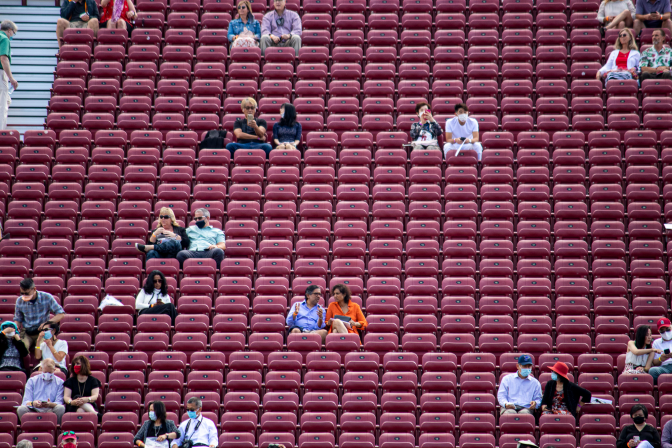This story is free to read because readers choose to support LAist. If you find value in independent local reporting, make a donation to power our newsroom today.
California bans legacy admissions at colleges. The end of affirmative action is a reason why

California’s private nonprofit colleges will no longer be able grant students an admissions advantage if their parents donated to or went to the same college after Gov. Gavin Newsom signed a law Monday banning the practice.
The state joins a rarefied group of four others that have passed laws banning legacy admissions. Colleges will still be allowed to admit students with alumni or donor ties, but they’ll no longer be able to grant preferential treatment to those applicants in the admissions process.
“In California, everyone should be able to get ahead through merit, skill, and hard work,” Newsom wrote in a press statement. “The California Dream shouldn’t be accessible to just a lucky few, which is why we’re opening the door to higher education wide enough for everyone, fairly.”
The law kicks in next year.
Partly because California enrolls the most number of college students out of any state in the country, bill backers say this legislation is a necessary corrective to last year’s U.S. Supreme Court ruling that banned all but military colleges from using race as a factor in admissions.
The court unwound almost 50 years of precedent allowing college admissions offices to use affirmative action as a way to promote campus diversity.
Like that court decision though, the legislation Newsom signed — Assembly Bill 1780 by Assemblymember Phil Ting, a Democrat from San Francisco — will affect just a few campuses in California.
Public campuses in California don’t practice legacy admissions. And state voters in 1996 changed California’s constitution to forbid public schools from using race as a factor in admissions.
If the Supreme Court decision last year sowed doubt for students that they’re wanted on college campuses, this bill aims to reverse that feeling in California and across the country, supporters say, particularly at a time when more high school graduates are skipping out on college, especially men. And while most colleges in California admit the vast majority of students who apply, backers of the bill are concerned about highly selective schools that are often conveyor belts for corporate and political influence.
In showing students that wealth doesn’t offer a leg up in the admissions process, “you’re doing something bigger related to culture and (social) fabric as students are questioning the value of college altogether and whether or not they want to pursue a higher education,” said Jessie Ryan, president of The Campaign for College Opportunity, a California-based advocacy and research organization that co-sponsored Ting’s bill.
Only seven private nonprofit universities out of about 90 in California admitted students whose family members either donated money to the school or attended the school themselves in fall 2022. Slightly more than 3,300 undergraduates — out of an admissions class of 31,633 — were legacy admissions. Last fall, it was six colleges and about 2,100 students admitted with legacy or donor ties as a factor.
At one school, Northeastern University Oakland, fewer than 10 students who were admitted based on legacy ties did not meet the school’s admissions criteria last fall. The other campuses — Claremont McKenna College, Harvey Mudd College, Santa Clara University, Stanford University, University of Southern California — admitted students with legacy or donor ties who all met admissions standards.
The association that represents private colleges in California opposed the bill, but was able to fight to remove harsher penalties from an earlier version.
Those would have forced colleges to pay a civil penalty equal to the amount they got in state financial aid grants if they continued to use legacy as a factor in admissions — a cost of several million dollars for some colleges that enroll relatively high numbers of low-income students.







